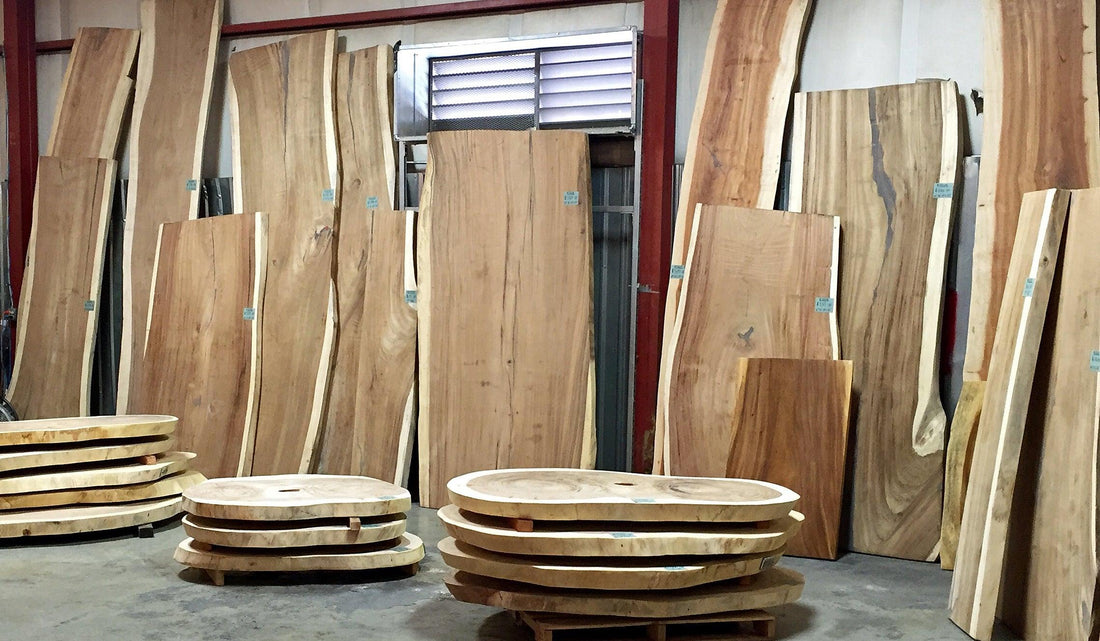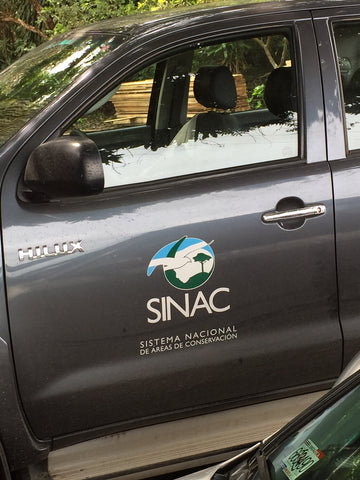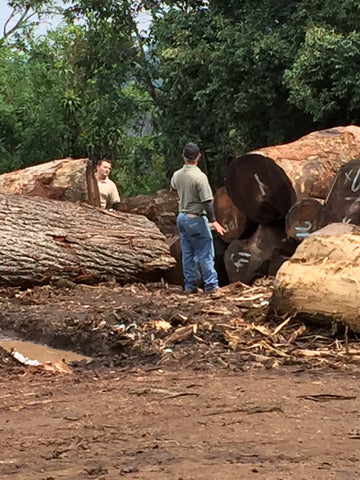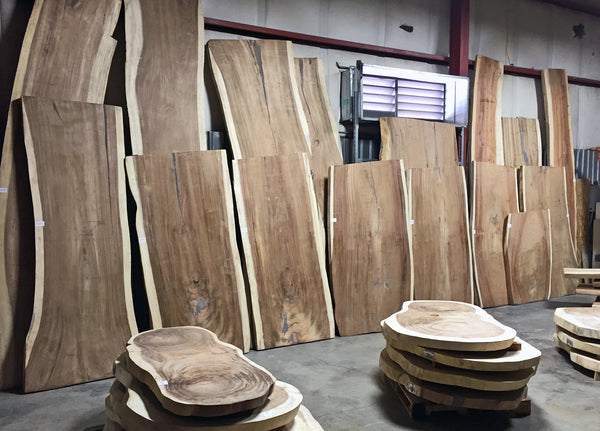
Sustainably Harvested Natural Edge Wood Slabs
Share
Sustainably Harvested Natural / Live Edge Wood Slabs
A natural edge or live edge wood slab is a beautiful addition to any home. You'll find them used as a dining table top, a desk top, a bathroom vanity and even a kitchen island counter top. Each slab is different and is preserved for time for us to enjoy visually. But, our clients often ask if our natural edge wood slabs are sustainably harvested and we understand their concern as deforestation is an international problem.
Impact Imports began selling wood slabs around 2002 along with other items we were already importing from Indonesia. Although we received verbal assurances that all the wood was legal, we were never really sure where the wood was coming from. This is one of the reasons we stopped importing wood slabs from Indonesia.
In 2016, Impact Imports found a new supplier of wood slabs in Costa Rica. After making a trip to their factory in the spring of 2016, we were convinced these slabs were sustainably harvested and their cutting, extraction, trucking, milling, drying, etc., can easily be tracked due to the simple system Costa Rica has created to prevent deforestation. Since the creation of their system, Costa Rica has reversed the decline of their forests, something they are very proud of. The following is a fairly detailed overview of the step by step process of their system.
Lots of Checks and Balances and Paperwork
Costa Rica has reserves and parks and 35% of the territory is untouchable for harvesting wood. Any tree, even the one in your back yard must get Costa Rican Government authorization and a permit to be cut. There is no "clear cutting" or concession in Costa Rica, only selective cutting on private land is allowed.
Any person who wants to cut a few trees on his / her property must request a study by a private forestry engineer. This study is presented to the Ministry of Forestry (MINAE). The MINAE send their own engineer and review which trees they will authorize to cut. As the property owner, you may ask to cut 15, for example, but the MINAE may only authorize 10 to be cut and will recommend to the landowner to save the other 5 for cutting at a later date. The rule is usually only 3 trees are authorized to be cut per 1 hectare (2.5 acres) in farmland. But they can authorize more if the landowner is in some special areas highly populated with trees. These maximums help to maintain the overall health of the forest. After the study is done by the MINAE forestry engineer and each of the authorized trees marked with a GPS position, the owner of the land receives his or her license to cut.
After cutting the trees authorized, but before the trees are cut into logs and transported, the landowner contacts MINAE to review the trees cut. The GPS coordinates for each tree are double checked for accuracy and, if the landowner cut the wrong tree or one tree more than authorized, the penalty is 3 to 5 years in jail, along with all trucks, wood and other assets seized by the police. We assume the landowner closely supervises the cutting when the chainsaw is fired up!
Assuming the correct trees are down, the MINAE gives the landowner tags for each log he or she wants to move. This tag is called a GUIA. When all the logs have tags, the logs can be moved to the mill. The GUIA tags are only good for 2 weeks, so the landowner has to move the wood to a mill during this period of time. After this date, if they did not move the wood, they must ask MINAE for a GUIA again. Costa Rica does this to control the wood moving throughout in the country. If any single log has no tag and they get caught with this log, again jail time and penalties are assessed.
In Costa Rica, logging trucks can only move logs between 5 am to 9 pm. Any truck trying to move wood at night are automatically considered illegal and the driver will be arrested. Police stops are set up randomly throughout the country to check all trucks moving during the night.
Witnessing The A Part Of The Inspection Process First Hand
When the logs arrive at the mill, the logging truck driver gives the GUIA to the owner of the mill and an inventory is completed before the logs are unloaded. At any time an inspector from MINAE may arrive at the mill for inspection and, as luck would have it, on our first visit to the mill in the spring of 2016, the MINAE inspectors showed up to inspect a recently unloaded pile of logs. They were very thorough with their inspection!

At the time of inspection at the mill, the MINAE inspectors mark all the new logs with their own logo by hammering their logo into the end of a log. They then remove the original GUIA tags so they can't be used again. At any time if MINAE find one log without their logo mark, or new logs coming without a tag, the mill will get shut down.
When it comes time to export the slabs, the exporter (in our case, the supplier we buy from) must present the original license to cut which was given to the owner of the land, the GUIA which is the authorization to move the wood, mill invoices (to avoid small mill cutting in the forest) and a copy of the kiln dryer license. Even after all of this, the exporter needs an inspection by another organization, the Ministry of Agriculture (MAG) before the table top slabs are allowed to be exported. When Impact Import's supplier export our slabs, he must supply a certificate of origin. In order to acquire this certificate, our supplier needs to present all of the documents mentioned. Costa Rican Customs will not let the wood go unless the supplier presents the inspection documents made by the MAG. As you can see, it's not easy to export wood from Costa Rica, so it's practically impossible for illegal wood to be cut, transported, processed and exported from the country.
Costa Rica is an international leader when it comes to maintaining their forests and they are controlling their forests in the right way. The current deforestation rate in Costa Rica is 0%, with the total land surface of Costa Rica covered in forest currently at 52% and growing. They will possibly be the first neutral carbon country in the world by 2020, and their deforestation is currently 0%. No other country in the world can claim that. Impact Imports is proud to know we sell legally and sustainably harvested natural / live edge wood slabs. Here is a link to our current inventory of sustainably harvested natural edge wood slabs and table tops.


